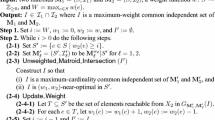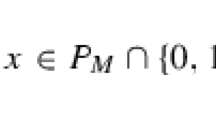Abstract
This paper studies optimal matroid partitioning problems for various objective functions. In the problem, we are given k weighted-matroids on the same ground set. Our goal is to find a feasible partition that minimizes (maximizes) the value of an objective function. A typical objective is the maximum over all subsets of the total weights of the elements in a subset, which is extensively studied in the scheduling literature. Likewise, as an objective function, we handle the maximum/minimum/sum over all subsets of the maximum/minimum/total weight(s) of the elements in a subset. In this paper, we determine the computational complexity of the optimal partitioning problem with the above-described objective functions. Namely, for each objective function, we either provide a polynomial time algorithm or prove NP-hardness. We also discuss the approximability for the NP-hard cases.
Similar content being viewed by others
Notes
We remark that the condition \(I_i\ne \emptyset ~(\forall i\in [k])\) is imposed to make the objective function well-defined. Moreover, if we define \(\max _{e\in \emptyset }w_i(e)=0\), \(\min _{e\in \emptyset }w_i(e)=\infty \), and \(\sum _{e\in \emptyset }w_i(e)=0\), then we can reduce the problem where empty sets are allowed to our problem by adding dummy elements.
In order to make the paper self-contained, we give a proof in Appendix.
More precisely, we prove that it is NP-hard to distinguish whether the minimum \((\max ,\min )\) and \((\sum ,\min )\)-value of a given problem instance is positive or zero.
References
Babel, L., Kellerer, H., Kotov, V.: The \(k\)-partitioning problem. Math. Methods Oper. Res. 47, 59–82 (1998)
Burkard, R.E., Yao, E.: Constrained partitioning problems. Discret. Appl. Math. 28, 21–34 (1990)
Chen, S.P., He, Y., Lin, G.: 3-Partitioning for maximizing the minimum load. J. Comb. Optim. 6, 67–80 (2002)
Dell’Amico, M., Martello, S.: Bounds for the cardinality constrained \(p, c_{\max }\) problem. J. Sched. 4, 123–138 (2001)
Dell’Olmo, P., Hansen, P., Pallottino, S., Storchi, G.: On uniform \(k\)-partition problems. Discret. Appl. Math. 150, 121–139 (2005)
Dinur, I., Steurer, D.: Analytical approach to parallel repetition. In: Proceedings of the Forty-sixth Annual ACM Symposium on Theory of Computer, pp. 624–633. ACM (2014)
Edmonds, J.: Minimum partition of a matroid into independent subsets. J. Res. Natl. Bur. Stand. B Math. Math. Phys. 69B, 67–72 (1965)
Edmonds, J.: Submodular functions, matroids, and certain polyhedra. In: Combinatorial Structures and their Applications (Proceedings of the Calgary International Conference on Combinatorial Structures and their Applications 1969), pp. 69–87. Gordon and Breach, New York (1970)
Edmonds, J., Fulkerson, D.R.: Transversals and matroid partition. J. Res. Natl. Bur. Stand. 69B, 147–153 (1965)
Feige, U., Peleg, D., Kortsarz, G.: The dense \(k\)-subgraph problem. Algorithmica 29(3), 410–421 (2001)
Frank, A.: A weighted matroid intersection algorithm. J. Algorithms 2(4), 328–336 (1981)
Garey, M.R., Johnson, D.S.: Computers and Intractability: A Guide to the Theory of NP-Completeness. Freeman, New York (1979)
He, Y., Tan, Z., Zhu, J., Yao, E.: \(k\)-Partitioning problems for maximizing the minimum load. Comput. Math. Appl. 46, 1671–1681 (2003)
Kawase, Y., Kimura, K., Makino, K., Sumita, H.: Optimal matroid partitioning problems. In: Proceedings of the 28th International Symposium on Algorithms and Computer (ISAAC 2017), pp. 51:1–51:13 (2017). https://doi.org/10.4230/LIPIcs.ISAAC.2017.51
Kellerer, H., Woeginger, G.: A tight bound for 3-partitioning. Discret. Appl. Math. 45, 249–259 (1993)
Korte, B., Vygen, J.: Combinatorial Optimization: Theory and Algorithms. Springer, New York (2002)
Lawler, E.L.: Matroids with parity conditions: a new class of combinatorial optimization problems. Memo. number ERL-M334, Electronic Research Laboratory, College of Engineering, UC Berkeley, Berkeley (1971)
Lee, J., Sviridenko, M., Vondrák, J.: Matroid matching: the power of local search. SIAM J. Comput. 42(1), 357–379 (2013)
Lenstra, J.K., Shmoys, D.B., Tardos, É.: Approximation algorithms for scheduling unrelated parallel machines. Math. Program. 46, 259–271 (1990)
Li, W., Li, J.: Approximation algorithms for \(k\)-partitioning problems with partition matroid constraint. Optim. Lett. 8, 1093–1099 (2014)
Lovász, L.: Matroid matching and some applications. J. Comb. Theory B 28(2), 208–236 (1980)
Moshkovitz, D.: The projection games conjecture and the NP-hardness of ln \(n\)-approximating set-cover. Theory Comput. 11(7), 221–235 (2015)
Oxley, J.G.: Matroid Theory. Oxford University Press, New York (1992)
Schrijver, A.: Combinatorial Optimization. Springer, New York (2003)
Verschae, J., Wiese, A.: On the configuration-LP for scheduling on unrelated machines. J. Sched. 17, 371–383 (2014)
Wu, B., Yao, E.: \(k\)-partitioning problems with partition matroid constraint. Theor. Comput. Sci. 374, 41–48 (2007)
Wu, B., Yao, E.: Lower bounds and modified LPT algorithm for \(k\)-partitioning problems with partition matroid constraint. Appl. Math. A J. Chin. Univ. 23, 1–8 (2008)
Acknowledgements
We thank the anonymous reviewer for giving us comments which improves the presentation of the manuscript. The first author is supported by JSPS KAKENHI Grant Number JP16K16005. The second author is supported by JSPS KAKENHI Grant Number JP15H06286. The third author is supported by JSPS KAKENHI Grant Number JP24106002, JP25280004, JP26280001, and JST CREST Grant Number JPMJCR1402, Japan. The forth author is supported by JST ERATO Grant Number JPMJER1201, Japan, and JSPS KAKENHI Grant Number JP17K12646.
Author information
Authors and Affiliations
Corresponding author
Additional information
Publisher's Note
Springer Nature remains neutral with regard to jurisdictional claims in published maps and institutional affiliations.
A preliminary version of this paper can be found in [14]
Omitted Proof in Theorem 2
Omitted Proof in Theorem 2
Lemma 2
([2]) Let \((E, \mathcal {I})\) be a partition matroid defined by \(\mathcal {I} = \{ I \,:\,|I \cap S_i| \le \eta _i \ (i\in [p]) \}\) with weight w, where \((S_1,\dots ,S_p)\) is a partition of E, \(\eta _1,\dots ,\eta _p\) are positive integers, and \(|S_i|=\eta _i\cdot k\) for each \(i\in [p]\). Let \(I_{i,j}\) consist of \(\eta _i\) elements with the \(\eta _i\) largest weights in \(S_i\setminus (\bigcup _{h=1}^{j-1}I_{i,h})\). Then \((\bigcup _{i\in [p]} I_{i,1},\dots ,\bigcup _{i\in [p]} I_{i,k})\) is an optimal solution to the minimum \((\sum ,\max )\)-value matroid partitioning problem \((E, (\mathcal {I}, w), k)\).
Proof
Let \((I_1^*,\dots ,I_k^*)\) be an optimal partition. Without loss of generality, we may assume that \(\max _{e\in I_1^*}w(e)\ge \dots \ge \max _{e\in I_k^*}w(e)\). Let j be any index in [k]. In addition, let \((i', e_j)\) be the pair of an index and an element attaining \(\max _{i \in [p]} \max _{e \in I_{i,j}}w(e)\). We claim that \(\max _{e \in I^*_j} w(e) \ge w(e_j)\). To show this, we suppose the contrary. We denote \(S = \bigcup _{h < j} I_{i', h} \cup \{e_j\}\). Note that \(|S| = (j-1)\eta _{i'}+1\) and \(w(e) \ge w(e_j)\) for all \(e \in S\). Since \((E, \mathcal {I})\) is a partition matroid, at most \((j-1)\eta _{i'}\) elements in S are contained in \(I^*_1, \ldots , I^*_{j-1}\). By assumption \(\max _{e \in I^*_j} w(e) < w(e_j)\), there is an index \(\ell > j\) such that \(I^*_{\ell }\) has some element \(e' \in I^*_{\ell } \cap S\). Then we have \(\max _{e \in I^*_{\ell }}w(e) \ge w(e') \ge w(e_j) > \max _{e\in I^*_j} w(e)\), which contradicts the assumption \(\max _{e\in I^*_j} w(e) \ge \max _{e \in I^*_{\ell }}w(e)\).
Thus, we have
Therefore, \((\bigcup _{i\in [p]} I_{i,1},\dots ,\bigcup _{i\in [p]} I_{i,k})\) is also an optimal solution. \(\square \)
Rights and permissions
About this article
Cite this article
Kawase, Y., Kimura, K., Makino, K. et al. Optimal Matroid Partitioning Problems. Algorithmica 83, 1653–1676 (2021). https://doi.org/10.1007/s00453-021-00797-9
Received:
Accepted:
Published:
Issue Date:
DOI: https://doi.org/10.1007/s00453-021-00797-9




